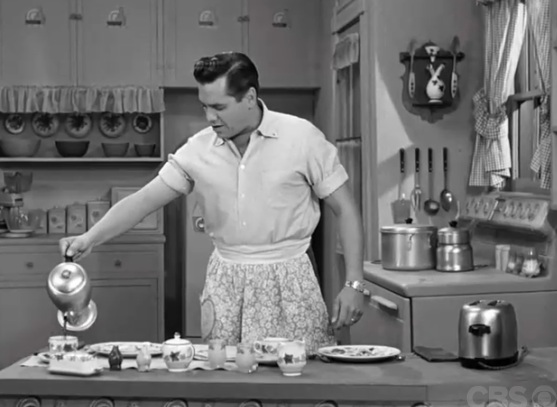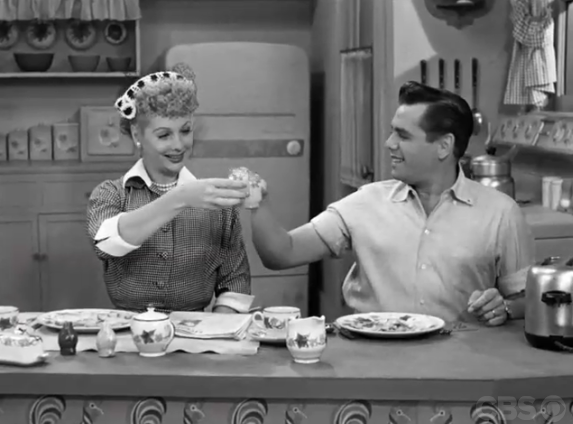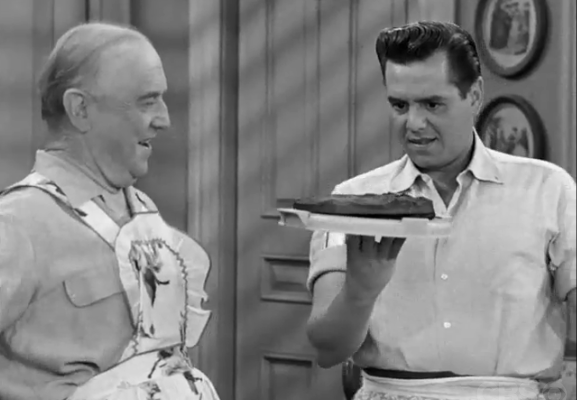The second season opener of I Love Lucy, titled “Job Switching” (Sept. 15, 1952), explicitly highlights the significance of gender dynamics and narratives within the show. This episode significantly influenced the reception and trajectory of the series throughout its run.
Ricky and Fred argue that women have it easier staying at home and managing the household, as opposed to entering the workforce and earning a living.
Lucy and Ethel hold a differing perspective, prompting the men to propose a role swap: they take over housework while the women work in a candy factory. They aim to determine who faces the more challenging situation in 1950s America.
The episode commences with an irate Ricky returning from work, standing in the living room with crossed arms, and reproaching Lucy for her spending habits.
He demands to know, “I don’t know what is wrong with you, but your bank account is overdrawn every single month. What’s the reason?” Lucy responds with a half-hearted smile, saying, “You don’t give me enough money.”
Ricky retorts, “I don’t give you enough money. Do you think this is a game?” As he backs her into a corner, he continues, “Do you realize how tough it is for a guy to make a buck these days?
Do you think money grows on trees?” Ricky’s questioning of Lucy’s spending habits and financial management underscores how men might permit their wives to handle the family budget.
However, when spending becomes problematic, they assert their authority. While the scene is meant for humor, it carries disconcerting undertones.
Ricky looms over Lucy, suggesting that she is a simple-minded individual or a child incapable of managing without the astute guidance of men like Ricky, who are presumed to keep women and their capricious habits in check.
While Lucy and Ricky engage in a discussion about their finances, Fred and Ethel make their entrance. Lucy extends an invitation for them to stay, and just as in “Men are Messy,” both couples adopt positions rooted in gender-based assumptions.
Fred expresses his concern to Ricky, stating, “She spends money like I was printing it in the basement. Let’s face it, Rick. Regarding money, there are two kinds of people: the earners and the spenders.
Or as they are more commonly known, husbands and wives.” Fred’s alignment with Ricky due to their shared gender illustrates the series’ reliance on the “battle of the sexes” concept for comedic effect.
Ricky further elaborates, saying, “If they had to earn the dollar, they would think twice before spending it so freely.” Ethel and Lucy then pose the question that propels the episode forward: “What’s so challenging about earning a living?”
Their query captures the burgeoning feminist sentiment of the 1950s, as more women entered the workforce and began advocating for equality at home and in the workplace—a goal that would only start to be realized in the late 1970s (and remains an ongoing pursuit today).
In a condescending manner, Ricky responds to the women, saying, “Holding down a job is far more demanding than lounging around the house all day.”
Lucy and Ethel, clearly perturbed by their husbands’ assumption that their labor is effortless and inconsequential, retort, “Is that all you think we do? Who do you think handles the housework? And who do you think prepares all the meals?”
Ricky, echoing the sentiments of many American men in the 1950s, dismisses Lucy’s questions and declares, “Anybody can cook and manage the housework.” Lucy challenges Ricky’s dismissal of their work and asserts, “I’d love to see you two give it a try for a week.”
To make his point, Ricky exclaims, “Okay, we will. You’ll have to go out and earn the living.”
In the subsequent scene, Ricky is portrayed in the kitchen, donning an apron as he prepares breakfast.
As Ricky and Lucy sit down to enjoy their meal, Lucy compliments his culinary skills and inquires, “Where did you acquire all these cooking talents?” Ricky responds with a smile, saying, “Perhaps I’m just a naturally gifted cook.”

While Lucy reads the newspaper, Ricky asks about the kind of job she plans to pursue, but she ignores him, mirroring his past instances of neglect during breakfast in previous episodes.
Lucy uses this moment to convey, “Now you understand what I go through every morning,” aiming to give Ricky a deeper appreciation of her daily experiences. In response, Ricky pledges to “reform.”
The phone interrupts their meal, and Lucy answers it. She learns that Ricky had bought their breakfast from a nearby drugstore, the same place where he left his hat.
Lucy points out to Ricky that he could have attempted to cook breakfast using the groceries available at home. However, Ricky explains that his attempt at making eggs didn’t turn out as expected, leading to the wastage of a dozen eggs.
This scene highlights the irony that, despite Ricky’s confident claims, he can’t even make his own breakfast. Moreover, despite lecturing Lucy about spending money, Ricky finds it acceptable to purchase breakfast when he is the one responsible for providing it.
Following this, Lucy and Ethel head to the local employment agency to seek assistance in finding job opportunities. They attempt to persuade the man in charge of the office that they can handle any job, despite their lack of prior workforce experience.
The man presents a list of potential job openings, and Lucy becomes excited when he mentions vacancies for candy makers.
While Lucy and Ethel embark on their job search, Ricky remains at the apartment, diligently handling laundry and ironing. Fred arrives, donning a kerchief on his head, and attempts to offer Ricky some guidance on housework.
Ricky, in turn, displays a piece of clothing he inadvertently scorched, prompting a mutual exchange of tips and tales of their own mistakes. Fred inquires about how to iron silk stockings, and Ricky enlightens him that you don’t iron them but instead ensure there’s plenty of starch when washing.
Ricky proceeds to show Fred one of Lucy’s stockings that he washed, resulting in a stiff, board-like appearance, more suited for a sign than a person.
This scene, designed to portray men as inept at domestic chores humorously, insinuates that women are better suited for home-based work.
Upon arriving at the chocolate factory for their jobs, Lucy gets assigned to the chocolate dipping department, while Ethel takes a position in the packaging department. Lucy observes as a neighboring woman tempers the chocolate and expertly rolls the candy into ball shapes.
Lucy underestimates the difficulty of the task and ends up looking more like she’s making mud pies rather than dipping candy. She attempts to converse with the other woman but with no success.
Ultimately, Lucy ends up with chocolate smeared on her face when she accidentally transfers chocolate to the woman’s face next to her while trying to swat a fly. The scene undoubtedly elicits humor, but it also reinforces the notion that women in the workforce are portrayed as ineffective.
Lucy isn’t merely struggling at her job—her ineptitude is portrayed in a comical manner, highlighting how her efforts to prove her point to Ricky often result in her appearing as a bumbling character.
Following the laundry mishap, the scene shifts to Ricky, who efficiently vacuums the house while reading a newspaper. When Fred arrives with a cake, Ricky makes a comment, stating, “You know why women claim that housework is so challenging—because they don’t use their heads.”
This remark implies that if women were more innovative than men, they could accomplish more. Fred, in response, shows Ricky his seven-layer cake, which turns out as flat as a pancake.
Also Read: Women In The Box: Ethel Mertz, I Love Lucy
Ricky informs Fred that he has the main course under control, having prepared four pounds of rice for four people and two chickens placed in a pressure cooker. However, when the pressure cooker’s lid blows off, chaos ensues as the chickens are launched across the kitchen.
The chickens fall from the ceiling, and Ricky and Fred scramble to collect them and attempt to wash them in the sink.
Once again, their lack of culinary and housekeeping skills is highlighted as they try to clean the chickens using dish detergent and a scouring brush.
Meanwhile, on the stove, the pot of rice overflows, creating a mess. Ricky and Fred turn around to find the kitchen in disarray and attempt to catch the rice using bowls, their hands, and anything within reach, including a broom and dustpan.
While struggling to clean up, they slip on the rice and end up on the floor. These comical scenes, undoubtedly humorous, further reinforce the idea that men can only excel outside the home and serve to uphold the cultural assumptions of the 1950s that a man’s role belonged in the workforce, not engaged in household chores.
What initially appears to be a somewhat progressive recognition of the challenges of being a housewife ultimately solidifies the notion that a woman’s place is within the home.
After experiencing unsuccessful attempts in various positions at the candy factory, Lucy and Ethel ultimately find themselves working in the wrapping department. Their task is individually wrapping each candy by hand as it travels from the kitchen to the packing room via a conveyor belt.
They are informed that they will be dismissed if even a single piece of candy remains unwrapped. Initially, Lucy and Ethel manage to keep up with the pace, but when the conveyor belt’s speed increases, they begin to lag behind and resort to unconventional methods to prevent the candies from reaching the other room.

Lucy starts stuffing chocolates into her mouth, shirt, and hat to maintain the pace. As production surges, the women struggle to keep up, and the humor in the scene unfolds as viewers watch Lucy and Ethel endeavor to stuff chocolates in their mouths, shirts, and hats.
The scene carries an ironic twist as Lucy and Ethel discover that a product widely consumed by women in the 1950s is challenging to manufacture and relies on women’s labor for its production.
The episode concludes with the scene of Lucy and Ethel returning to Lucy’s apartment, reminiscent of Ricky returning home after a demanding day at work.
Both women appear thoroughly exhausted, and Ethel clutches her stomach, a consequence of consuming too much candy. They discover a note on the kitchen door left by Fred and Ricky, advising them to wait until the men return.
Lucy enters the kitchen and, upon doing so, lets out a loud scream. She reemerges, informing Ethel, “It’s a complete mess. Food is scattered everywhere—on the floor, walls, ceiling. It’s chaotic.” Lucy then confesses to Ethel, “I don’t want to clean it up.”
Ricky and Fred return, bearing gifts and admitting, “We make terrible housewives.” Lucy responds with a smile and says, “We’re not great at bringing home the bacon. We got fired from our first job.”
Ricky expresses relief, saying, “We’ll earn the money, and you can spend it. And listen, girls, we never fully appreciated how challenging it is to run a household before.”
The men then present their wives with five-pound boxes of chocolates, and the women promptly faint.
As the episode draws to a close, the 1950s status quo of gender relations is restored, implying that perhaps the men and women have gained some insights from their experience.
Nevertheless, the women are compelled to resume their roles as homemakers, while the men find freedom in the workplace.
Despite the episode containing hints of proto-feminist themes, ultimately, it reaffirms masculinity as the dominant factor in the shaping of American social structure.
Two other episodes from the series demonstrate the show’s intent to engage with the ongoing conversations surrounding the concept of American masculinity during that era. “Ricky Has Labor Pains” (Jan. 1, 1953) and “Lucy Goes to the Hospital” (Jan. 19, 1953) depict a softer, more compassionate side of Ricky’s masculinity.
These episodes also shed light on the show’s endeavor to reinforce Ricky’s image as a model of masculinity by emphasizing the significance of fatherhood in shaping men into responsible and mature American citizens.
In essence, by portraying Ricky as a father, the series aimed to cement his image as a typical middle-class American man, transitioning from being a renowned bandleader to a devoted father.
The show explores the role of masculine authority and assumptions about gender dynamics, consumerism, and the evolving nature of the American family and home throughout I Love Lucy.
Ricky exemplifies that even the most assertive of wives could, and often should, benefit from the guidance of a strong male influence. Lucy frequently appears to face consequences for asserting her own agency, while Ricky’s authority remains unquestioned.
Televised depictions of masculinity through characters like Ricky Ricardo helped American men shape their self-identity, with popular series such as I Love Lucy playing a pivotal role in this process.


